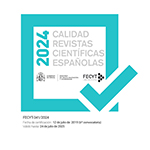Italian ma ‘but’ in deverbal pragmatic markers: Forms, functions, and productivity of a pragma-dyad
Resumen
This paper focuses on the development, paradigmaticization, and productivity of a set of complex pragmatic markers in Italian, which are constituted by two distinct elements, namely the adversative conjunction ma ‘but’ and a deverbal pragmatic marker (e.g., ma dai ‘come on! really!’, literally: ‘but give’, or ma piantala ‘just stop! give it a rest!’, literally ‘but dump it’). The main idea we will develop is that such a complex pattern can be better described in terms of a pragma-dyad, i.e., a dyadic construction with a pragmatic meaning, featuring a fixed element which systematically combines with a set of preferential fillers. In our case, the fixed element is ma, which generally signals a contrast with the interlocutors’ point of view, thus shaping the pragmatic meaning of the resulting complex in terms of interactional contrast. Such a meaning is then functionally enriched through a variety of fillers compatible with the schema, which actualize it in conveying mock politeness, disagreement, counter-expectation, and pragmatically neighbouring values. By providing a corpus-based study of the development and productivity of these complex markers, we illustrate the empirical and theoretical advantages which a pragma-dyadic approach can offer in exploring processes of functional enrichment involving complex markers.
Descargas
Descarga artículo
Licencia
La revista Cuadernos de Filología Italiana, para fomentar el intercambio global del conocimiento, facilita el acceso sin restricciones a sus contenidos desde el momento de su publicación en la presente edición electrónica, y por eso es una revista de acceso abierto. Los originales publicados en esta revista son propiedad de la Universidad Complutense de Madrid y es obligatorio citar su procedencia en cualquier reproducción total o parcial. Todos los contenidos se distribuyen bajo una licencia de uso y distribución Creative Commons Reconocimiento 4.0 (CC BY 4.0). Esta circunstancia ha de hacerse constar expresamente de esta forma cuando sea necesario. Puede consultar la versión informativa y el texto legal de la licencia.










